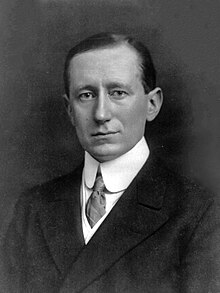Marconi
| Guglielmo Marconi | |
|---|---|
 |
|
| Born | Guglielmo Giovanni Maria Marconi 25 April 1874 Palazzo Marescalchi, Bologna, Italy |
| Died | 20 July 1937 (aged 63) Rome, Italy |
| Residence | Italy |
| Nationality | Italian |
| Alma mater | University of Bologna |
| Academic advisors | Augusto Righi |
| Known for | Radio |
| Notable awards |
|
| Signature | |
Guglielmo Marconi, 1st Marquis of Marconi (Italian: [ɡuʎˈʎɛlmo marˈkoːni]; 25 April 1874 – 20 July 1937) was an Italian inventor and electrical engineer known for his pioneering work on long-distance radio transmission and for his development of Marconi's law and a radio telegraph system. He is often credited as the inventor of radio, and he shared the 1909 Nobel Prize in Physics with Karl Ferdinand Braun "in recognition of their contributions to the development of wireless telegraphy".
Marconi was an entrepreneur, businessman, and founder of The Wireless Telegraph & Signal Company in the United Kingdom in 1897 (which became the Marconi Company). He succeeded in making a commercial success of radio by innovating and building on the work of previous experimenters and physicists. In 1929, the King of Italy ennobled Marconi as a Marchese (marquis).
Marconi was born into the Italian nobility as Guglielmo Giovanni Maria Marconi in Bologna on 25 April 1874, the second son of Giuseppe Marconi (an Italian aristocratic landowner from Porretta Terme) and his Irish/Scots wife Annie Jameson (daughter of Andrew Jameson of Daphne Castle in County Wexford, Ireland and granddaughter of John Jameson, founder of whiskey distillers Jameson & Sons). Between the ages of two and six, Marconi and his elder brother Alfonso were brought up by his mother in the English town of Bedford. After returning to Italy, and at the age of 18 University of Bologna physicist Augusto Righi, neighbour of Marconi who had done research on Heinrich Hertz's work, permitted Marconi to attend lectures at the university and use the lab and library as well. Marconi received further education in Florence at the Istituto Cavallero and, later, in Livorno. Marconi did not do well in school, according to Robert McHenry, though historian Giuliano Corradi characterizes him in his biography as a true genius. He was baptized as a Catholic but had been brought up as a member of the Anglican Church, being married into it (although this marriage was later annulled). Marconi was confirmed in the Catholic faith and became a devout member of the Church before his marriage to Maria Christina in 1927.
...
Wikipedia
